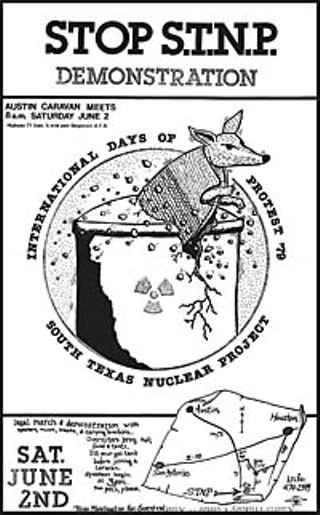The Roots of the Left
From Scholz Garten to 'The Daryl Herald,' four slices of progressive Austin life
By Mike Clark-Madison, Fri., July 4, 2003

Wanna Buy a Used Nuke?
"It's like what my daddy always says: If you don't have anyone mad at you, you haven't done anything." That was several names, jobs, dress sizes, and political parties ago, but even in 1979, then-Mayor Carole McClellan was a master of the faux homespun quip. And at getting people mad at her. Having just been returned to office by what, until 2000, was the largest margin ever for an Austin mayor, McClellan was roundly booed on election night by hundreds of progressives who -- to their surprise and outrage -- had just lost a ballot fight with the mayor over the ever-controversial South Texas Nuclear Project.The April 1979 election was neither the first nor the last of the nuke's eight trips to the Austin polls, but it was one of the few times the STNP fracas woke up the wider world; nine days earlier, the near-meltdown at Three Mile Island had thrown the future of nuclear power up in the air, and the Austin vote was dubbed a referendum on the industry. Even McClellan said she was "shocked" by Austinites' vote to spend $215.8 million more on the nuke (as she had wished) and their vote against selling the city's 16% share of the STNP (as progressives had wished) so soon after the Pennsylvania accident.
That $215.8 million was more than the nuke was supposed to cost Austin in the first place. Seven years earlier, then-Mayor Roy Butler and city electric officials had basically begged Houston Lighting and Power to allow Austin to buy a share of the STNP, and Butler managed to convince voters to go along (on the second attempt) with an investment of $161 million. By 1979, that was closer to $500 million. It ended up being more than $1 billion for a plant that didn't go online until 1989 (10 years behind schedule), was then shut down for years over safety concerns, and is now shut down again. So much for McClellan and other nuke boosters' claims of endless cheap energy.
Actually, both sides in 1979 claimed frugality -- the pro-nuke Committee for Economical Energy, and its spokesman Neal Spelce, squared off against the anti-nuke Austin Citizens for Economical Energy, and its spokesman Roger Duncan. The latter group, one of many ad hoc anti-nuke campaigns over the years, was cousin and ally of the Texas Mobilization for Survival (known to many simply as MOBE), which in the 1970s led Austin progressives in the sort of broad-scale, think-global-act-local protest that no longer plays much of a role in local politics. In the MOBE era, nuclear power, nuclear war, other kinds of war, and other kinds of energy blended with the more enduring Austin concerns into a single issue. (From a safe-energy campaign letter in 1980: "Underlying STNP is a much larger issue. ... There is tremendous economic and political pressure on us from outside investors to force us to expand from an attractive city of 350,000 to over twice that by the turn of the century." They were only off by about 50,000 people.)
The 1979 vote turned out to be the nuke's high-water mark in Austin political esteem; the pro-STNP campaign, with McClellan starring in the TV ads, managed to avert selling Austin's nuke share by only 2%. It was downhill from there, as Brown and Root and HL&P (today's Reliant Energy) managed to do what Three Mile Island could not. As the cost of the STNP continued to balloon (and the "N" was dropped like a fig leaf), federal regulators imposed a stop-work order on the plant after revelations of Brown and Root's ghastly failures as the design contractor. By 1981, McClellan was despised as no Austin mayor has been since, and after HL&P fired Brown and Root in September, the ACEE forces won a November referendum ordering the city to shed its share of the nuke.
For more than two decades, nobody has wanted to buy it -- but it was a moral victory just the same, validating Duncan's claim that the 1979 campaign showed that progressives "had made tremendous gains in the community. ... I still believe the South Texas Project will never produce economical energy for the city of Austin." He should know better than most -- after winning election to the City Council, then serving as city-planning director, Roger Duncan became an executive at Austin Energy.
Got something to say on the subject? Send a letter to the editor.








